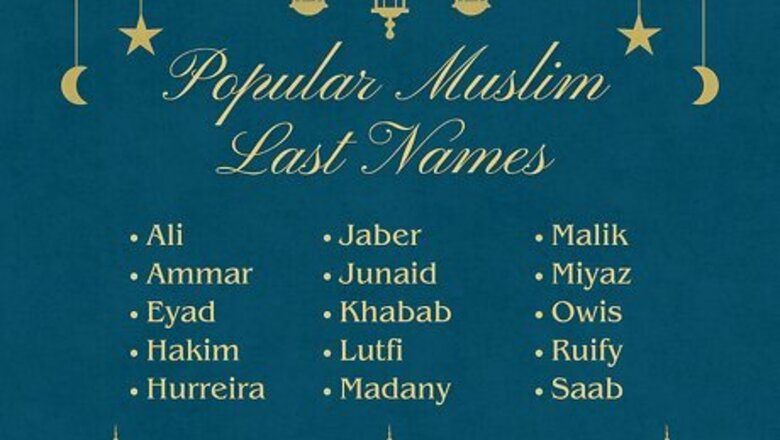
views
Popular Muslim Last Names
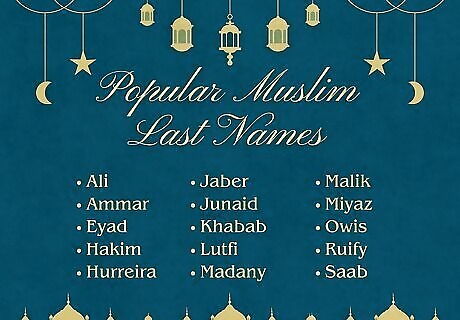
Some of the most famous last names are associated with Islamic history. Many of these surnames have specific meanings, like Eyad, meaning “reinforcement,” or Hussein, meaning “small, beautiful castle.” They are also often powerful in nature, like Saab, meaning “lion,” and Owis, meaning “little wolf.” Here are some of the most popular Muslim last names: Ali - “High in rank.” Allaq - “Something that clings or commits to.” Ammar - “Works fast and hard.” Anaas - “Finding comfort through familiarity with a person/place.” Emaa - “Communicating without speech.” Eyad - “Reinforcement,” “support,” or “mountain.” Hakim - “Scientist.” Harith - “Farmer” or “green.” Hurreira - “A narrator.” Hussain - “Small, beautiful castle.” Jaber - “Comforter” or “condolences.” Jafar - “A small stream” or “a rival.” Junaid - “Soldier.” Khabab - “Someone who runs, walks, and wrestles.” Khallous - “Pure” or “clear.” Lutfi - “Kind” or “nice-looking.” Madany - “Civilized” or “modern.” Malik - “The owner of something.” Mazen - “One who walks in a hurry.” Miyaz - “Preferred” or “special.” Okasha - “Weaving” or “spider.” Owis - “Little wolf.” Ruify - “Of high standing or rank.” Saab - “Lion” or “tenacious.” Saaeb - “Someone who chooses the most appropriate option.” Saleh - “Beneficial” or “virtuous.” Salem - “safe and sound.” Thabet - “Firm.” Walid - “Newborn baby.” Zaid - “Development” or “growth.”
Traditional Muslim Last Names
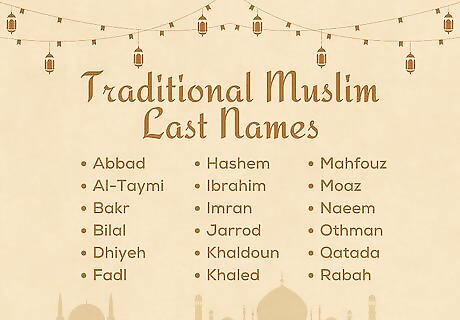
Many traditional surnames reflect important aspects of Islamic tradition. These names often point to historical figures, like “Al-Ghazali,” who was an Islamic philosopher. Another is Bakr, a companion of the Prophet Muhammad. Others have meanings associated with Islamic principles, like Amanah, meaning “loyalty,” or Fadl, meaning “honorable.” Abbad - “Worshipper of Abdullah.” Al-Ansar - “Helpers of the Prophet in Madinah.” Al-Dimashqi - “From Damascus.” Al-Ghazali - A famous Islamic philosopher and theologian. Al-Qurashi - “Belonging to the Quraysh tribe.” Al-Taymi - “descendant of the Banu Tamim tribe.” Al-Tunisi - “From Tunisia.” Amanah - “Trust,” “loyalty,” or “reliability.” Arqam - A Historical figure whose home was used in the first Muslim community meetings. Asim - “Protector,” “guardian,” or “shield.” Bakr - One of the companions of the Prophet Muhammad. Bilal - “The first muezzin of Islam” or “to satisfy thirst.” Dhiyeh - “Military leader.” Fadl - “Honorable” or “respectable.” Hashem - “Generosity” or “the destroyer of evil.” Ibrahim - Arabic name of the prophet Abraham. Imran - An Islamic narrator and one of the first people to convert to Islam. Jarrod - It was the name of the companion of the Prophet Khaldoun - An ancient Arab spirit. Khaled - “Eternity.” Mahfouz - “The one whom God always protects.” Mahmoud - “Thanked by people.” Moaz - A historical figure who converted to Islam from another religion. Musab - The first ambassador of Islam; means “ability” or “strong.” Naeem - A historical figure who converted to Islam during the Battle of the Trench. Nafi - A physician recommended by the Prophet Muhammad; means “useful.” Obeid - “Humble servant of God.” Omar - The name of the Muslim caliph Omar ibn al-Khattab. Othman - “A friend of Muhammad.” Qatada - One of the companions of the Prophet. Rabah - “Profit.”
Common Muslim Last Names
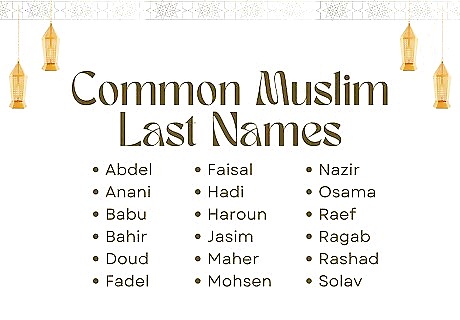
Typical Muslim surnames also include simple words and everyday phrases. Some include names like Bahi, meaning “beauty,” or Solav, meaning “wine.” Many focus on happiness and joy, like Bahjat, or truthfulness, like Sadek. Some are still based in the Islamic faith; for example, Ashour is the 10th day in the Islamic month of Muharram. Abdel - Used for a “servant or slave of the master.” Abubakar - “Father of a young camel.” Anani - “Cloud.” Ashour - The 10th day of the Islamic month of Muharram. Ayad - “Recurrence,” “benefit,” “blessings,” and “power.” Babu - Related to the Egyptian god Babi, Osiris’s firstborn son. Bahi - “Beauty.” Bahir - “Bright.” Bahjat - “From joy” and “happiness.” Bakir - “Coming early”; it means “copper” in Turkey. Baraa - “He recovered from illness.” Doud - “Beloved” or “cherished”; Arabic form of David. Fadel - “Virtuous,” “generous,” and “excellent.” Faisal - “A person who separates between the true and false.” Hadi - “Leader” or “guide”; one of the 99 names of God in Islam. Haroun - Egyptian form of “Aaron,” meaning “mountain of strength.” Jasim - “Great and huge person.” Maher - “Talented” or “expert.” Mohsen - “Benefactor.” Nazir - “One who has vowed or dedicated.” Osama - “Lion” or “the one with a name.” Raef - “Merciful and compassionate person.” Ragab - “Lord of God” and “Lord Ram.” Rashad - “Young gazelle” and “good judgment.” Sadek - “Truthful” or “honest friend.” Said - “Master”; also means “to be happy, fortunate, or lucky.” Samer - “Someone who hangs out and talks to people at night.” Shafiq - “Compassionate,” “merciful,” and “tender.” Shoukry - “Thankful” or “grateful.” Solav - “Wine.” Zahir - “Manifest”; one of the names of God in Islam.
Rare Muslim Last Names
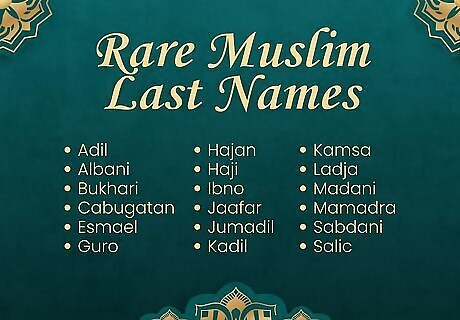
There are a multitude of uncommon Muslim names with unique meanings. Some of the following lesser-known names have roots in Hebrew or Turkish, while others refer to the land, like Alamada. Ibno is an unusual variation of the Arabic prefix “ibn,” meaning “son of.” Very rare names like Cabugatan don’t have a known meaning. Abdulrahman - "servant of the Most Merciful.” Adil - “Just,” “fair,” or “righteous.” Alamada - “The place” or “the land.” Albani - “White”; can refer to an Albanian. Alim - “Learned,” “wise,” or “scholar.” Alon - “Oak tree.” Bukhari - “The city of Bukhara.” Cabugatan - Unknown meaning. Esmael - “God will hear.” Guro - Relates to historical figures in Islam. Hajan - “Holy journey” or “sorrow.” Haji - Title for someone who has completed the Hajj (pilgrimage to Mecca). Ibno - A version of “son of.” Jaafar - “Stream” or “small river.” Jumadil - Relates to Jumada, a month in the Islamic calendar. Kadil - “Judge.” Kamid - “Leader” or “commander.” Kamsa - Unknown meaning. Kasan - “Handsome” or “good.” Kazemi - Refers to the followers of the Islamic figure Musa al-Kazim. Ladja - Unknown meaning. Madani - “Pertaining.” Mamadra - Unknown meanings. Sabdani - “Wise man” or “saint.” Salic - “Traveler.” Tahil - The recitation of the declaration of faith, "La ilaha illallah,” meaning “there is no god but Allah.” Tan - “Daybreak” or “twilight” in Turkish. Ulama - “The learned ones.” Usop - “God will add”; a variation of the Hebrew Yusuf. Wahab - “The bestower” or “the giver.” Yusop - “God increases.”
Arabic Muslim Last Names
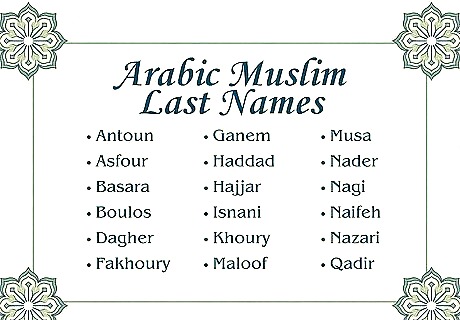
The majority of Muslim surnames have roots in the Arabic language. They can have a variety of meanings and associations, from Bishara, meaning “good news,” to Nagi, meaning “friend.” Others involve titles or occupations like Khoury, meaning “clergy,” and Hajjar, meaning “stonemason.” Some even describe a type of person; Moghadam means “one who is elevated.” Antoun - “Priceless.” Asfour - “Sparrow” or “freedom.” Basara - “Sight” or “vision.” Bishara - “Good news.” Boulos - “Small”; a variation of Paul. Dagher - “Boldness” or “a blacksmith.” Fakhoury - “A pottery maker.” Ganem - “Successful” or “fortunate.” Haddad - “Blacksmith.” Hajjar - “Stonemason.” Isnani - Unknown meaning. Khoury - “Priest” or “clergyman.” Maloof - "Familiar" or “accustomed.” Moghadam - “One who is elevated.” Musa - “Saved from the water”; a form of Moses. Nader - “Rare” or “precious.” Nagi - “Friend” or “saved.” Naifeh - “Beneficial” or “noble.” Nazari - “Vision” or “gaze.” Qadir - “Powerful.” Rabbani - “Divine” or “godly.” Rahal - “Traveler.” Rahman - “Gracious” or “merciful.” Saadeh - “Good fortune.” Safar - “Travel.” Shalhoub - “To warm oneself by the fire.” Shamoon - “God has heard.” Tahir - “Virtous” Touma - “Twin”; a form of Thomas. Wasem - “Handsome” or “grateful.”
Indian Muslim Last Names
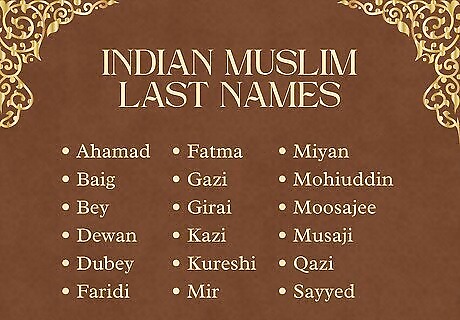
Many Muslim names are used by Indians who practice Islam. More often than not, they include spelling variations of traditional Muslim surnames, like Ahamad instead of Ahmad. Others share a lineage with Hindium, since many Muslim Indian people keep surnames that belong to their Hindi-related ancestry. Ahamad - “Highly praised.” Baig - “Chief” or “lord.” Bey - A noble or chieftain title. Dewan - “Treasurer.” Dubey - Also Hindi, meaning “one who has studied two Vedas.” Faridi - “Singular” or “incomparable.” Fatma - “To abstain.” Gazi - “Warrior” or “conqueror.” Girai - Unknown meaning. Kazi - “Judge.” Kureshi - A lineage within the Quraish tribe. Mir - “Commander” or “prince.” Miyan - “Between” or “middle.” Mohiuddin - “Reviver of the faith.” Moosajee - “Son of Musa.” Musaji - “To draw” or “to pull.” Qazi - “Magistrate.” Sayyed - Given to “descendants of the Prophet Muhammad.” Seedat - “Descendants of the Prophet Muhammad”; a version of Sayyed. Shakur - “Thankful” or “grateful.” Shikalgar - “A polisher.”
Muslim Last Names in Other Cultures
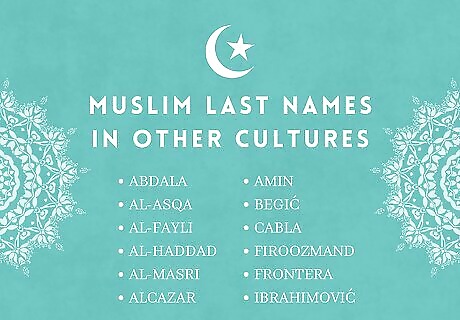
Muslim surnames are used in Islamic populations worldwide. Large Muslim communities can be found in Asia, including countries like Bangladesh, Indonesia, and Pakistan. Smaller Muslim populations exist in places like Albania and Bosnia-Herzegovina, where the surnames appear more Slavic. Here are some more culturally varied Muslim last names: Abdala - “Servant of Allah.” Al-Asqa - The name of the Al-Aqsa Mosque in Jerusalem. Al-Fayli - “The prosperous one.” Al-Haddad - “The blacksmith.” Al-Masri - “The Egyptian.” Alcazar - A Spanish surname meaning “the castle.” Amin - “Trustworthy” or “faithful.” Begić - A Bosnian surname meaning “son of a nobleman.” Cabla - Refers to the cubic structure found in Mecca. Firoozmand - “Victorious” in Persian. Frontera - “Living near a border.” Ibrahimović - “Son of Ibrahim” in Bosnian. Khanum - Given to a “noblewoman” in Persia. Noorbakhsh - A Persian surname meaning “bestower of light.”
Muslim Naming Customs
Muslim surnames are based on the father’s genealogy. Most children inherit their father’s name, but they may also inherit the name of their grandfather or the names of family members from additional generations. Muslim last names may also refer to the following: Geography: For example, Al-Makkawi means “from Mecca” and Shami means “from Syria.” Occupation: For example, Haddad means “blacksmith” and Najjar means “carpenter.” Tribes: For example, Al-Qahtani means “from the Quhtan tribe.”
Muslim last names are not usually gender-specific. Surnames are passed down from parents to the children and are not assigned to girls or boys specifically. According to specific naming customs, they can often use gender-specific variations in the form of prefixes or suffixes. Here are some examples: “Ibn” or “bin” refers to the “son of”; for example, Ibn Abdullah means “son of the servant of God/Allah.” "Bint” refers to the “daughter of”; for example, Bint Husayn means “daughter of the handsome or beautiful one.” Prefixes like the Arabic “Al” are also used to describe a noble or well-regarded family. An example includes Al-Saud, given to “the family of Saud,” who rule Saudi Arabia.
Women’s names don’t change upon marriage. A Muslim woman’s genealogy must continue to preserve her father’s lineage, so she does not take on her husband’s surname when getting married. She may be referred to as “the wife of,” followed by her husband’s name, but it’s generally discouraged for wives to take their husbands ' last names. For example, a woman who is married to someone with the last name Fadel may be known as “Zawjat Fadel,” meaning “the wife of Fadel.”
What is the difference between Muslim and Arabic surnames?
Muslim last names are used by those who practice Islam. They are often of Arabic origins, but this may not always be the case. Muslim last names are seen as a subcategory of Arabic surnames that are typically (but not always) associated with Islamic religious tradition. A Muslim surname can be religious without being Arabic. Islam expert Idris Abdul-Zahir explains that “Islam is the name of the religion. Muslim is a practitioner of Islam.”
Arabic surnames belong to those of Arabic heritage, regardless of religion. Arabic last names refer to last names from the Arabic ethnolinguistic group and can also appear in Christian and Jewish Arabic populations (not just Muslim populations). Like Muslim last names, Arabic surnames follow the father’s genealogical line. They may also point to a specific tribe, city, or country of origin, as well as an occupation.













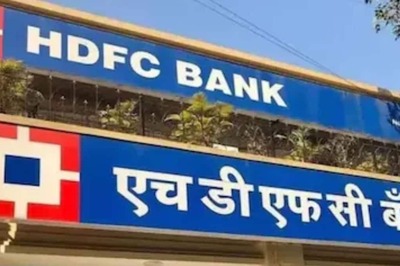

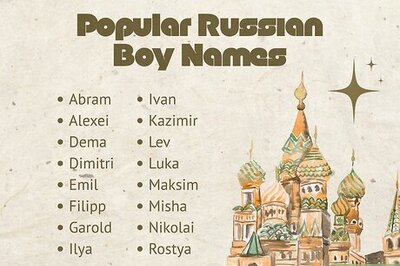

Comments
0 comment